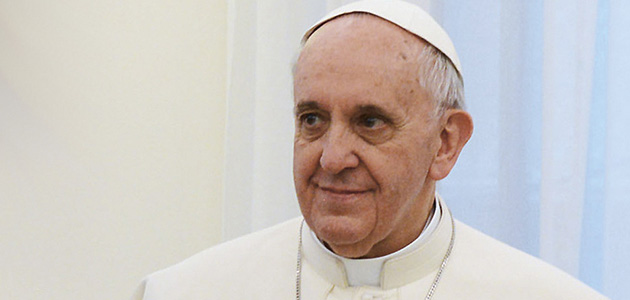‘In the discernments Pope Francis is currently having to make, his approach seems very Quakerly.’
Thought for the week: Michael Wright on Catholic tastes

I was once asked to say when I had last felt glad to be a Quaker. At the time I was reading each week the Anglican Church Times and the Catholic Tablet. I replied that every time I read those, I was glad I was a Quaker. A Friend took me to task for being unkind. It was not my intention to be so. I simply meant that while I got valuable information, insights and reviews from those periodicals, I was glad not to face some of the tensions present in the hierarchical structures of their churches, shaped by dogmas I had left behind.
I still read The Tablet every week with great benefit. What strikes me more and more is that Pope Francis, a Jesuit, is approaching the issues he faces by inviting his people to adopt a discernment process familiar to Friends.
Some years ago I read Beyond Majority Rule: Voteless decisions in the Religious Society of Friends, by Michael J Sheeran, also a Jesuit. The fruits of his two decades studying Quaker and Ignatian discernment helped me to understand better our own process.
In the discernments Pope Francis is currently having to make, his approach seems very Quakerly, and stems from his Jesuit training. He brings his concerns to the attention of the Catholic community. He invites them to reflect together, consider and come to discernment. He is not laying down a definitive line, but is inviting people to explore new ways of engaging with the issues prayerfully, and so find a corporate discernment.
His recent response to the Synod of Bishops has been regarded by some as a disappointment, in that he did not endorse the ordination to the priesthood of married men. Neither did he endorse new roles for women. But what he has done is to invite the Catholic community to reflect prayerfully on their faith, culture and traditions, and so be led to fresh understandings of pastoral and leadership roles. He has not closed the door on either issue.
Pope Francis has given responsibility to the Catholic community to discern where the Spirit is leading them. This is a radical change of culture for Catholics. It flows from the discernment of the Second Vatican Council in the 1960s but is something Catholics are not used to. Many lay Catholics are longing for such a change.
As a former Anglican priest, I am still surprised at the lack of involvement in discernment and decision-making of the lay Catholic community here in Britain. Bishops do not often seem to consult their clergy or their laity, and parish clergy often ride roughshod over the views of the laity – as reported weekly in The Tablet.
The Jesuit community sought in the last century, after many years of allowing their process of communal discernment to decline, to refresh their understanding of it – learning from Quaker practice, as Michael Sheeran explains. I hope Friends will hold Pope Francis and the worldwide Catholic community in the light as they seek to come afresh to practices of discernment which Quakers and Jesuits developed in the seventeenth century, independently of each other. And I hope we will all cherish these practices.
You need to login to read subscriber-only content and/or comment on articles.
